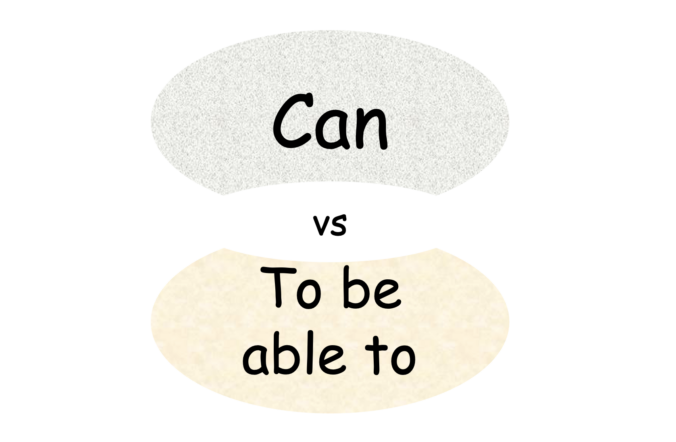Heute geht es um “können”, für das es im Englischen zwei Wörter gibt: can und to be able. Beide drücken eine Fähigkeit, Möglichkeit oder Erlaubnis aus. Die erste Besonderheit ist bereits, dass es den Infinitiv can nicht gibt (also kein to can).
Um genau zu sein, gibt es natürlich das Verb to can im Sinne von “eindosen” und “konservieren”, aber hier geht es heute um can wie “können”.
Auf geht’s, es gibt einiges Spannendes zu entdecken.
Can im Present Tense
Can und to be able to sind Modalverben, die beide in der Gegenwart (Present Tense) benutzt werden können.
Also:
- I can play the piano.
- Dan can speak French.
- I can climb the ladder.
- I can swim.
Und:
- I am able to play the piano.
- Dan is able to speak French.
- I am able to climb the ladder.
- I was able to swim across the river yesterday.
Die beiden Formen sind nicht ganz synonym. “I can play the piano” ist eine allgemeine Aussage. Ich habe gelernt, Klarvier zu spielen und kann es jetzt. “I am able to play the piano” bezieht sich eher auf einen genauen Zeitpunkt oder besondere Umstände. “You broke your arm yesterday. Are you able to play the piano in the concert hall tonight?”.
Dazu kommt noch, dass can eher umgangssprachlich klingt und to be able to etwas formell.
Weiterhin gilt: to be able geht immer (in allen Zeiten), auf can trifft das nicht zu.
- I am able to play the guitar. – Present Simple
- I will be able to play the guitar when I complete the guitar classes. – Future
- I was able to play the guitar when I was 14. – Past Simple
- You should be able to play the guitar in three months. – modals
Fähigkeit (etwas gekonnt zu haben) in einer bestimmten Situation in der Vergangenheit
Wenn wir etwas in der Vergangenheit und in einem bestimmten Kontext konnten, müssen wir to be able to (also was/were able to) benutzen und could als Vergangenheit von can geht nicht.
- I was able to /
couldsubmit the assignment even though I was really sick. - Liverpool was able to /
couldwin the match 5–2 despite two red cards. - He was able to /
couldfix the printer after two hours. - I was able to /
couldget a refund for my cancelled flight after 8 months! - The old woman didn’t speak English but we were able to /
couldcommunicate through body language. - He was able to /
couldopen the locked door with a bobby pin.
Fähigkeit (etwas nicht gekonnt zu haben) in einer bestimmten Situation in der Vergangenheit
Im negativen Fall (ich konnte etwas nicht tun in einer bestimmten Situation in der Vergangenheit) geht beides couldn’t und wasn’t / weren’t able to.
- I wasn’t able to /couldn’t call anyone because there was no signal on my phone in the village.
- He wasn’t able to / couldn’t sleep because of the construction noise next to his apartment.
- I wasn’t able to /couldn’t drive her to the airport because I had an important meeting.
- She wasn’t able to /couldn’t focus and she didn’t understand anything in her Math class.
- They weren’t able to /couldn’t find the car keys, we had to wait for them for 35 minutes.
- We weren’t able to /couldn’t calm her down after she broke up with her boyfriend, she cried for hours.
Could in bestimmten Situationen in der Vergangenheit
Es gibt allerdings eine Ausnahme, nach der wir could auch bei bestimmten Situationen in der Vergangenheit einsetzen können (sonst wäre es ja auch langweilig).
In Zusammenhang mit den Verben to see, to smell, to taste, to understand, to remember und to believe können wir mit could ausdrücken, dass wir etwas in der Vergangenheit in einer bestimmten Situation erreichen konnten.
- He was climbing the stairs, I could hear his footsteps and opened the door.
- I could feel his disappointment and decided to help him.
- I was shocked that she could remember my name after ten years.
- Fortunately, I could smell the burnt food and I ran to the kitchen quickly.
Could im Konditional
Could hat natürlich auch noch eine Rolle im Konditional um etwas zu beschreiben, das sein könnte.
- You could call her and apologise.
- You could have called her and apologise.
- I couldn’t have called her then, I was too upset.
Voilà, ich hoffe, dass etwas Neues dabei war bzw. das früher Erlernte ein wenig aufgefrischt wurde.
Einige Beispiele aus Englishorbust.

Schreiben Sie einen Kommentar